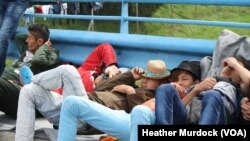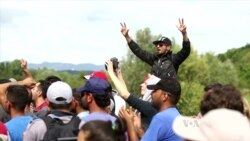After three days hiking in the forest, the 14 men were thrilled to see a road, and later a police officer driving down the road. Before leaving the group, a smuggler had told the men they only needed to hike a few hills before crossing the border into Austria.
They had brought only enough food and water for one day.
"We said: 'Hello, sir. Are we close to Vienna?' " explained Ayhem, a 40-year-old medical equipment manager from Baghdad.
"The police said: 'What? Vienna? This is Croatia,' " Ayhem continued. The smuggler had lied.
The police fed the hungry men and took them to a train station where they bought tickets to the border with Slovenia. Four days later, they remained at the closed border Sunday, like thousands of other people stuck at borders as they move toward Western Europe.
Less than a week ago, refugees were passing through Hungary to get to Austria, the first country on the refugee trail generally considered safe, and a potential place to settle. But since Hungary closed its borders Tuesday, refugees have scattered, attempting different routes and moving from border to border looking for a way to pass.
At one section of the Croatian border with Slovenia Sunday, about a dozen riot police stood like statues, as refugees chanted, "Open Borders! Open Borders," occasionally also chanting, "Please, please, please."
VOA's Daniel Schearf reports from Harmica, a town on Croatia's border with Slovenia:
Desperate attempts
Many of the hundreds of people had been waiting for days, and despite the spirited chants, there was an air of exhaustion with ringleaders struggling to keep up the momentum.
"If I die here, fine," said Abdullah, a 28-year-old Iraqi auto mechanic, "I won't go back to Iraq."
His friends nodded in agreement, saying they just want basic human rights they can't get at home.
"We all just want to live normal lives," said Ayhem. His neighborhood in Iraq is embroiled in sectarian conflict, he said, and his family had recently sold everything they owned to pay ransom to kidnappers.
"I just want to ride a bicycle, that's all," he joked, saying in the world he left he wasn't afforded even basic freedoms.
On the narrow bridge by the border chants built and faded, as marches were organized as much to give journalists something to film as anything else. One man looked like he was going to throw himself off the bridge until others stepped in.
The Iraqi men later said the suicide attempt was a stunt to garner sympathy from officials and journalists. It may not have been real, they said, but the desperation prompting the man to create such a show was as real as the garbage strewn along the bridge.
Littlest ones
There is a kind of mantra among refugees coming from the Middle East and Africa, determined to make new lives in Europe: "Go forward because there is no going back." And even the youngest among them believe it.
On the bridge by the border, with riot police on one side, and a picturesque Croatian country town on the other, 11-year-old Angie was proud to tell the story of how she and her older brother and mother spent seven hours on a smuggler's bus from Istanbul, not knowing where they would stop.
They were then packed into rubber boats and crossed the Mediterranean Sea overnight. The boats flooded, but they made it to shore, only to find they had landed on the wrong part of the Greek island. No taxi would carry them to the port for fear of being arrested for human trafficking.
Angie, like so many other children on this journey, walked for hours. As she told her story, Angie's friend and traveling companion leaned on the bridge railing and smirked, turning her baseball hat sideways. Angie pointed to the bandages on the girl's ankle.
"She got hurt in the sea," said Angie. "Then she walked."
After the long walk, they finally made it onboard a large ship in Lesbos that has been carrying thousands of new arrivals to Athens before they move on to cross into Macedonia. The boat had clean bathrooms, cafes and views of the Greek Islands. It had warm places to sleep, showers and electricity.
"It was so beautiful," Angie said, beaming at the memory.
But only a few meters away, the young men waiting at the border fence were getting restless, yelling loudly and instructing other men to join them in protest. Angie's teenage brother interrupted her story.
"This place will be for boys," he said, referring to the standoff he feared could be come dangerous. He pointed toward the other side of the bridge, farther from the police and the increasingly angry men. "Girls need to go over there," he said.







